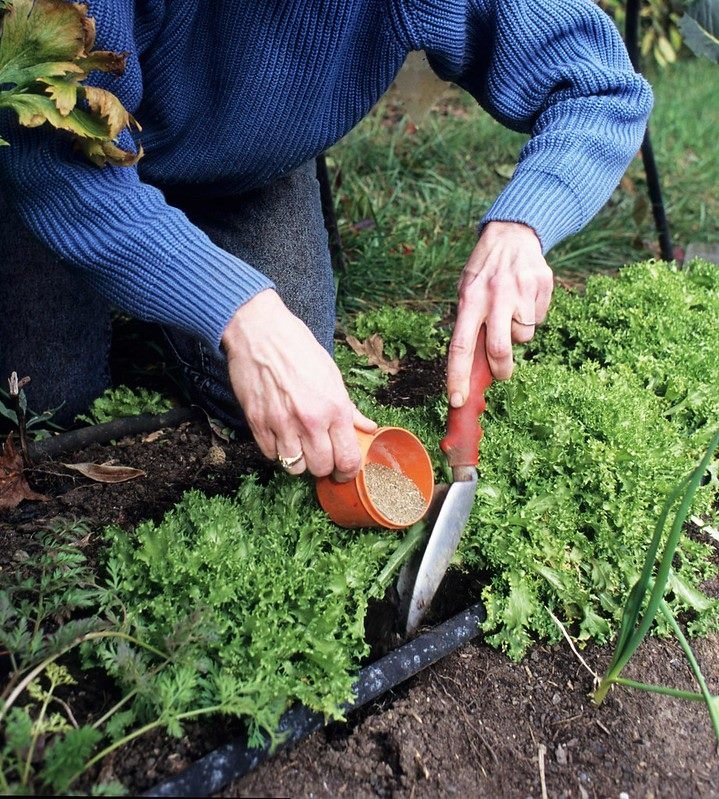Table of Contents Show
Good, fertile garden soil is the best prerequisite for lush blooming flowers and a rich harvest of vegetables and fruit.

In the specialist markets, there is a large number of different fertilizers to choose from, which provide the plants with the most important nutrients. These are often mineral fertilizers with nitrate. These artificial fertilizers have a bad ecological balance: the production of one kilo uses two liters of oil.
In addition, the nitrate can contaminate the groundwater and contribute to the over-fertilization of natural water bodies. Also, you can find here organic plant fertilizer products for better gardening through better soil.
Especially in the vegetable garden, it is better to avoid artificial fertilizers anyway, according to NDR garden expert Peter Rasch. Because the taste of the vegetables suffers, the rapid growth makes them very soft and spoils faster.
Definition: What is Organic Fertilizer?
Organic fertilizers are those that contain nutrients in an organically bound form. The raw materials used in them can be of animal or vegetable origin.
Unlike minerals, fertilizers plant nutrients are therefore not in the form of salt, which quickly dissolves in the soil water, but is packed in grown structures.
In order for plants to use them, these structures must first be broken down. Soil organisms take over this task and mineralize the components of the fertilizer. That means they break them down into their individual molecular and atomic parts.
The contained plant nutrients, which were previously “built-in”, are released again in this way. They get into the soil solution like the salt in a mineral fertilizer and can be taken up again by plants to form new organic structures.
Read Also:
Organic Fertilizers Release Nutrients More Slowly
Rasch recommends using organic fertilizers instead. Compared to mineral fertilizers, they contain less nitrogen, so a slightly larger amount has to be applied.
They only release the nitrogen when they are decomposed by the soil organisms and therefore develop their effect slowly and evenly.
Fertilize with Manure, Horn Shavings, and Sheep’s Wool
If you live in the country, you may have the opportunity to collect manure from the neighboring farm in autumn and work it into the soil. Alternatively, fertilizer pellets based on cattle manure or horse manure are available in garden centers.
Horn shavings and sheep’s wool are particularly good long-term animal fertilizers. Here, too, it takes time for the nutrients to be released during decomposition. Therefore, it should be applied in good time and regularly.
Vegetable Fertilizer in Pellet Form
If you prefer to use fertilizers of plant origin instead of animal origin, you can also find them in pellet form or as liquid fertilizers in the garden market, for example, based on cocoa bean shells. They are a by-product of the chocolate industry and contain many important plant nutrients.
Make Nettle Manure and Others Manure Yourself
Plant-based organic fertilizers are also very easy to make yourself. Plant manure contains a lot of nitrogen and potassium and is not only a gentle fertilizer, but also makes the plants resistant to aphids, spider mites, and caterpillars. They can be made from a variety of plants, such as nettle, horsetail, ground weed, dandelion, garlic, onion, and chamomile.
For the production, you need about one kilogram of plant cuttings to ten liters of water. The production of the liquid manure takes some time – it takes about two weeks until the batch is ready. Alternatively, you can buy the liquid manure as extracts and simply mix them.
Fertilize with Coffee Grounds and Household Waste
There is also a lot of waste in the household, which is well suited as fertilizer. Fish waste is a good fertilizer for tomatoes, says Peter Rasch. Bury the remains of the fish about ten centimeters under the young tomato plants.
By the time the roots get there, the fish has rotted. Coffee grounds are particularly good for fertilizing plants that require acidic garden soil, such as hydrangeas and rhododendrons, or cucumbers, zucchini, and strawberries. Always allow the coffee grounds to cool well and dry – if they are damp, they will mold easily.
Create Compost
Other household waste such as vegetable and fruit leftovers, and egg shells, but also garden waste such as lawn, shrub, and tree clippings can be put in the compost.
There they rot into nutrient-rich, humus-rich soil perfect for fertilizing or as a soil conditioner. However, caring for the compost does take some work, and it should be shifted or turned about every three months.
Fertilizing with Urine
What is less known is that urine is also a good fertilizer. However, it should never be applied undiluted, but diluted with water in a ratio of between 1:10 and 1:20.
Urine is particularly suitable for heavy feeders such as potatoes, tomatoes, pumpkins, and roses, and in autumn it is also ideal for fertilizing hedges and lawns. Compost can also be regularly poured with diluted urine, which enriches it with nutrients and accelerates decomposition.
Benefits of Organic Fertilizers
- Subsequent delivery of all important plant nutrients
- Improvement of soil properties (nutrient retention capacity, water capacity, root penetration, soil structure, promotion of soil organisms) by promoting humus formation
- Due to slow implementation, there is no or only a very small risk of over-fertilization or leaching; therefore the very safe and easy application
- The natural long-term effect, conversion depending on temperature and humidity largely prevents release from taking place when plants are not growing
- Production requires less energy and is, therefore, more ecologically justifiable since renewable raw materials are used instead of fossil deposits
- Can also be used as a liquid fertilizer
- Also available vegan, i.e. animal-free









